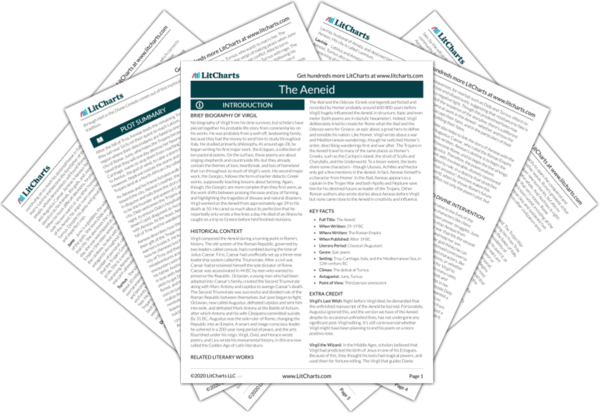Pietas is a Latin word that can be translated as piety or devotion, and refers to someone's dutiful acceptance of the obligations placed on them by fate, by the will of the gods, and by the bonds of family and community. From the first lines of the poem, Virgil describes Aeneas as being remarkable for his piety, and "pious" is the most-used adjective to describe Aeneas throughout the poem. Aeneas always places these obligations above his own feelings or desires. When the winds blast his ships and he wishes he had died defending Troy, he nonetheless pursues his fate. When Juno torments him, he is sad but not defiant. When Dido's love tempts him to stay in Carthage, he deserts her because he feels he must. To be pious does not mean to lack free will. In contrast, to be pious all the time is a choice, a difficult choice, and one that other characters do not make. Dido tries to thwart fate in order to preserve her love. Turnus refuses to accept that fate demands that Aeneas will marry the woman Turnus wants. For both characters, things end disastrously. In the Aeneid, it's only by being pious, by freely choosing to sacrifice ones own desires to the larger forces of fate, the gods, and family, that one can be heroic.
Yet it is worth noting that some scholars suggest that Virgil did not in fact view Aeneas as a perfect hero. What about his sneaky, unsympathetic departure from Dido? Why does he exit the Underworld through the gate of false dreams, instead of the gate of the true and pure? And why does the Aeneid end not with an image of Aeneas's leadership in his destined land, but with his frenzied murder of a defenseless man who begs him for mercy? Whether such arguments are the product of our modern society, which does not value the same things that Virgil's did, or whether Virgil himself saw a dark side to total piety, is a matter of continued debate.
Piety ThemeTracker

















